Germination Guide for Autoflowering Seeds
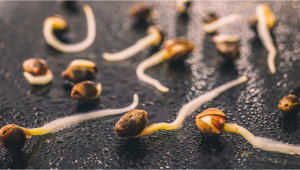
- 1. Intro
- 2. First things first: know the anatomy of your cannabis seed
- 3. The best conditions for germinating seeds
- 4. Top tricks for germinating old seeds
- 4. a. Soak in supplemented water
- 4. b. Scarification
- 4. c. Slightly open the seed
- 5. Paper towel germination method
- 6. Soaking overnight in a glass of water
- 7. Using a germination chamber
- 8. Rockwool cubes and peat pellets
- 9. Planting directly in medium
- 10. Top tips to improve seed germination
- 11. What to expect in the first couple of days after planting a germinated seed
- 12. Expert opinion by jorge cervantes - co-author:
- 13. In conclusion
Preface
The article "Germination Guide for Autoflowering Seeds" is a collaborative effort by Enzo Schillaci and Jorge Cervantes, who are well-established authorities in cannabis cultivation. This comprehensive guide provides detailed information on the germination of autoflowering cannabis seeds, covering various aspects such as the anatomy of cannabis seeds, optimal conditions for germination, tricks for germinating old seeds, different germination methods, and tips to improve seed germination. Designed to assist beginners and experienced growers, this guide aims to ensure a successful grow cycle by starting the cannabis plants on the right foot.
The significance of this article lies in its ability to offer practical and actionable advice for germinating cannabis seeds, a crucial first step in the cannabis cultivation process. Proper germination is foundational to developing a healthy plant and a successful harvest. The article underscores the importance of maintaining appropriate conditions, such as temperature and humidity, during germination. It solves everyday challenges like germinating or planting old seeds.
Enzo Schillaci, originally from Argentina, grew up in Amazonas, Brazil, and has traveled the world learning about cannabis cultivation. He has worked as a full-time cannabis writer, publishing articles on renowned websites such as High Times, CannabisTech, and The Bluntness. Jorge Cervantes, a pseudonym for George Van Patten, is a globally recognized expert on indoor, outdoor, and greenhouse cannabis cultivation. With more than 40 years of experience writing about cannabis cultivation, he is the author of several books, including "The Cannabis Encyclopedia."
Together, Schillaci and Cervantes bring a wealth of knowledge and expertise to this article, making it a valuable resource for anyone involved in cannabis cultivation. Their combined experience and authority in the field lend credibility to the advice provided in the article, making it a must-read for those looking to optimize their germination process and set the stage for a successful cannabis cultivation journey.
1. Intro
Seed germination is the first part of a successful grow cycle, to help you start your cannabis plants with the right foot, here’s an autoflower germination guide that can be used not only for cannabis but for tomatoes, mangos, strawberries... you name it!
So here’s how to germinate cannabis seeds with the best-known methods and a couple of tips that will get you harvesting in no time.
2. First Things First: Know the anatomy of your cannabis seed
The process of autoflower germination can take up to 10 days, in order to do everything correctly and know if everything's going well, we need to know a little bit more about the seed. First of all, we need to understand the anatomy of a cannabis seed. The cannabis seed has a dark brown, hard, and often striped, shell, this shell is what protects the insides which are extremely fragile.
When germinating, we need to hydrate the seed, this will soften the seed's shell and allow water to reach the embryo, when the water reaches it, the embryo will “activate” and start developing.
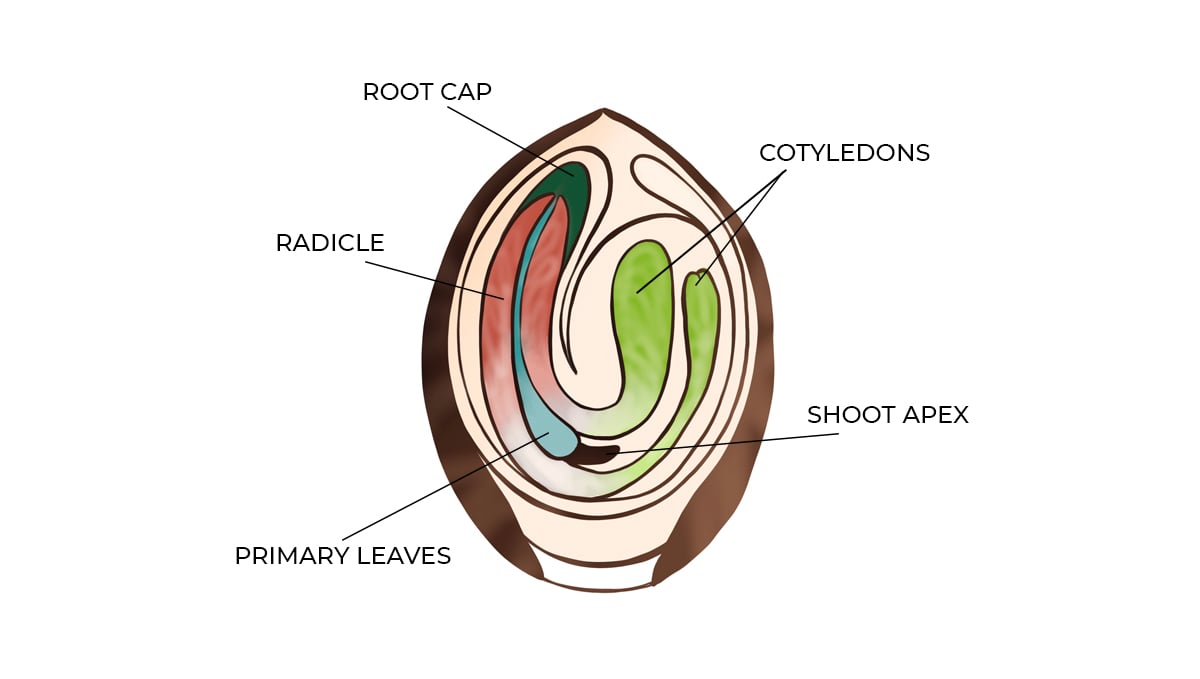
Have in mind that it's possible to drown the seed, so we need to keep an eye on moisture levels, also making sure it doesn't dry out. With a softened shell, it will be easier for the radicle to come out and this is when you’ll see the white taproot slowly appearing, and once it reaches 2-3cm, it’s time to plant it.
As soon as the seedling comes out of the medium, you’ll often see the shell stuck on top of the cotyledons, which are the tiny round leaves that you’re able to see once the shell has detached from the seedling. Those leaves are responsible for feeding the plant until the first set of true leaves appear. Also, there isn’t the best way to germinate marijuana seeds, you can do it any way you want, as long as you keep proper conditions, your seeds will germinate. So, if you’re wondering how do you germinate autoflower seeds? Read along for the best methods.
3. The Best Conditions For Germinating Seeds
As you may know, cannabis plants need certain conditions depending on the stage they’re in, maintaining these conditions are the best way to ensure your plants will thrive, and when talking about seeds and germination, it’s no different.
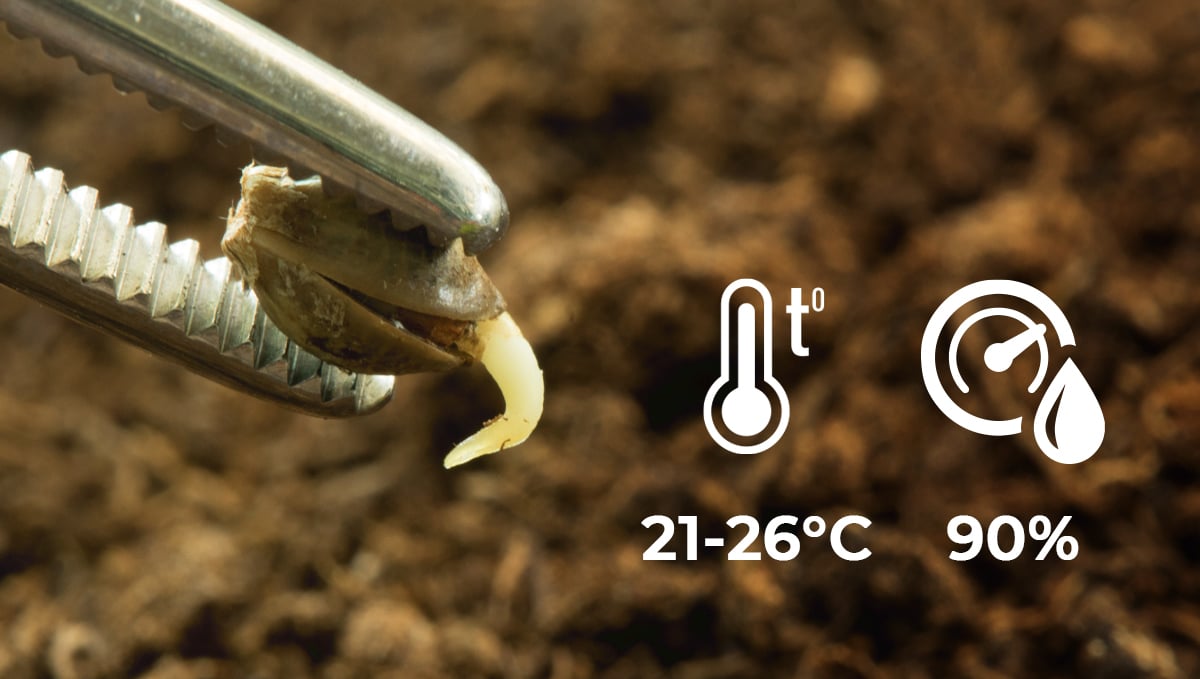
Obviously, you can grow cannabis plants in less-than-ideal conditions and they will still grow but it may end up affecting the yields or quality of your harvest.
When talking about germinating auto seeds, germinating in less-than-ideal conditions will decrease the chances of sprouting, so unlike growing cannabis in bad conditions, which will still grow but can affect the harvest, germinating in bad conditions can end up killing your seeds. So when germinating autoflowers you should keep the temperature between 21-26°C and the humidity as close as 90% as you can.
4. Top Tricks For Germinating Old Seeds
As said above, germinating in the ideal conditions will guarantee successful germination but sometimes seeds may be old or have been kept in bad conditions and can be hard to germinate. So, to help you germinate old seeds, here are a couple of tricks that will increase the chances of germination. But first of all, you need to know the best conditions to avoid these problems.
How To Properly Store Seeds
If you are storing seeds for your next grow cycle, you need to keep them in ideal conditions. If you’re going to germinate them during the next couple of days there’s no need to do anything extra, other than keeping them in a cool place and in complete darkness but if you’re planning to store them for months or even years, you should keep them in the fridge.
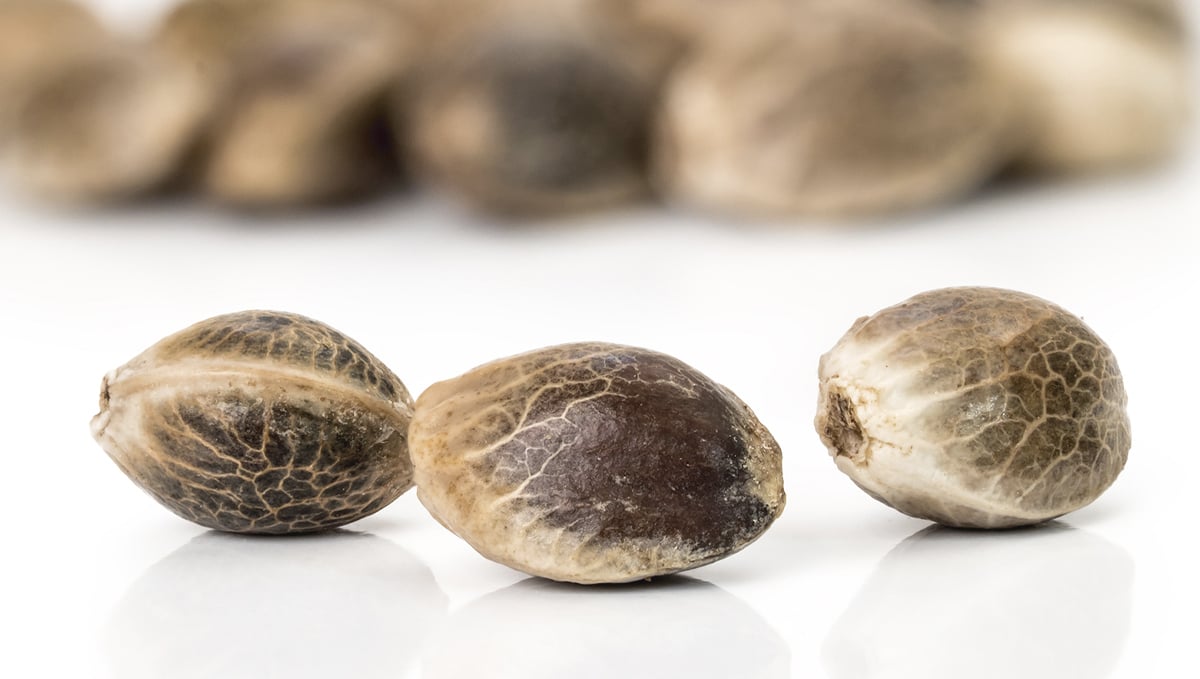
You should keep your seeds in an airtight container in a fridge set at 6-8°C with a relative humidity of between 20-30%, if you can’t set your fridge to the temperatures mentioned, just keeping them in the fridge will increase the chances of germination. Just have in mind that the better the conditions, the longer your seeds with last.
Soak in supplemented water
As cannabis seeds get old, the shell hardens and can make it hard for the water to reach the embryo, and if the water doesn’t reach the embryo, your seeds won’t sprout so if you’re dealing with old seeds, you can soak them in supplemented water.
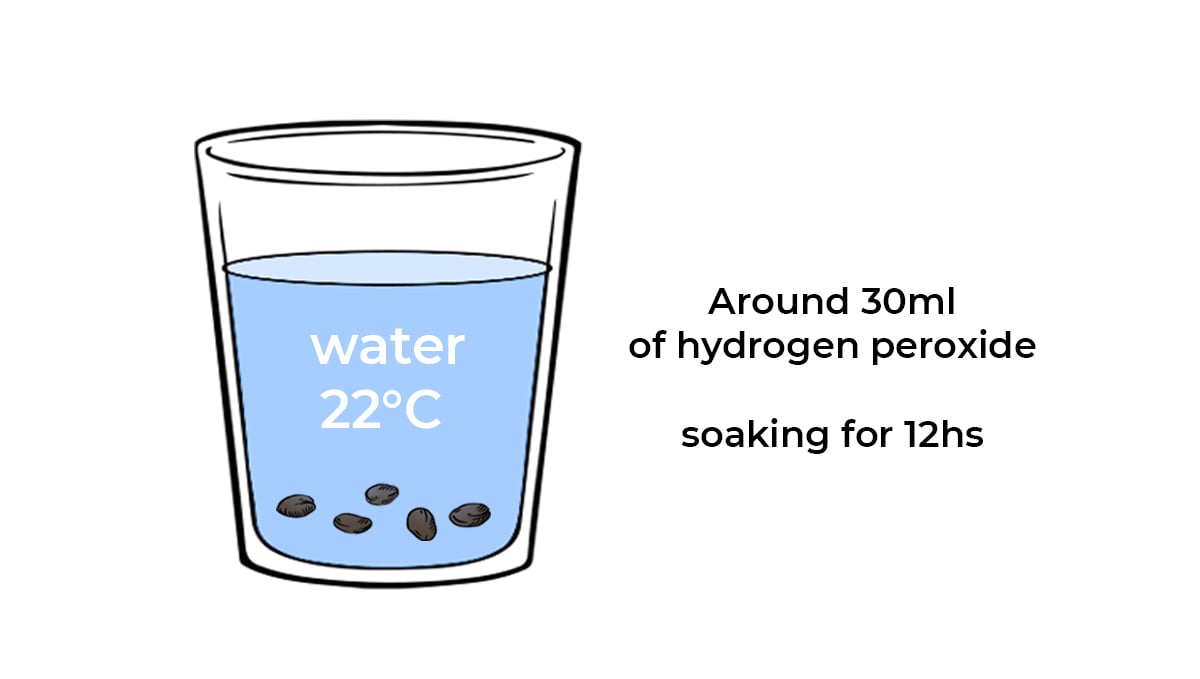
To do this, you can fill a glass cup with water and add around 2-3ml of hydrogen peroxide and leave your seeds soaking for 12hs, this should do the trick. You can also use germination boosters that you find in grow shops but usually, hydrogen peroxide works, also, make sure the water is around 22°C and it’s not getting direct sunlight.
Scarification
Scarification is a method used to make ridges on the seed to help water pass through, to do this properly, you will need a piece of sandpaper but you can improvise and do it with a matchbox. The goal is to thin out the shell so that the water can reach the embryo easily, just make sure you don’t overdo it and end up harming the embryo inside.
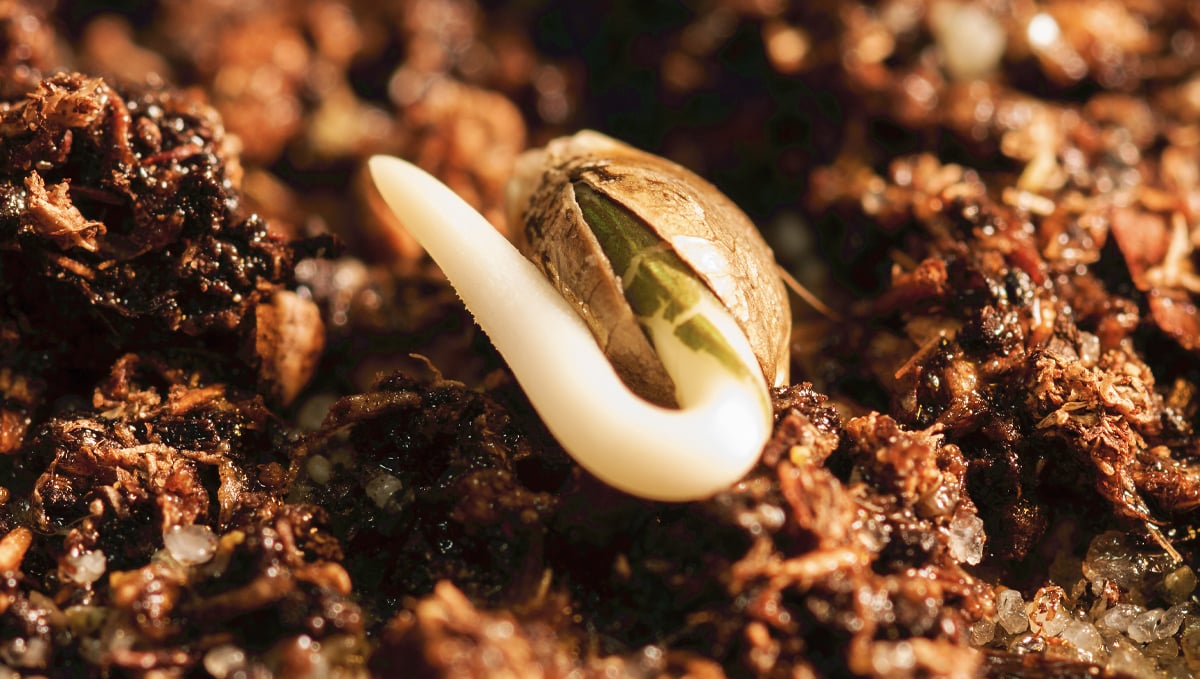
Slightly Open The Seed
As you may have seen, the seed is made out of two halves and has a ridge around it, if your seeds are old, that ridge may end up hardening too much and the seed won’t sprout. So to help your weed seed germinate, you can use a knife or any other tool with a thin point to gently insert it in between the ridges and slightly separate it, after this process, you can soak your water and germinate it like you normally would.
5. Paper Towel Germination Method
The paper towel method is the easiest of all methods. You'll need :
- 2 paper towels
- a plastic container or plates
- water
Step 1
Moisten the paper towels and wring them out so they're damp but not completely wet.
Step 2
Place the seeds on the paper towel, fold it over the seeds and place it in a plastic container, cover it with the lid to keep moisture in (can also use two plates instead of the plastic container, place the paper towel on a plate and use the other one to cover).
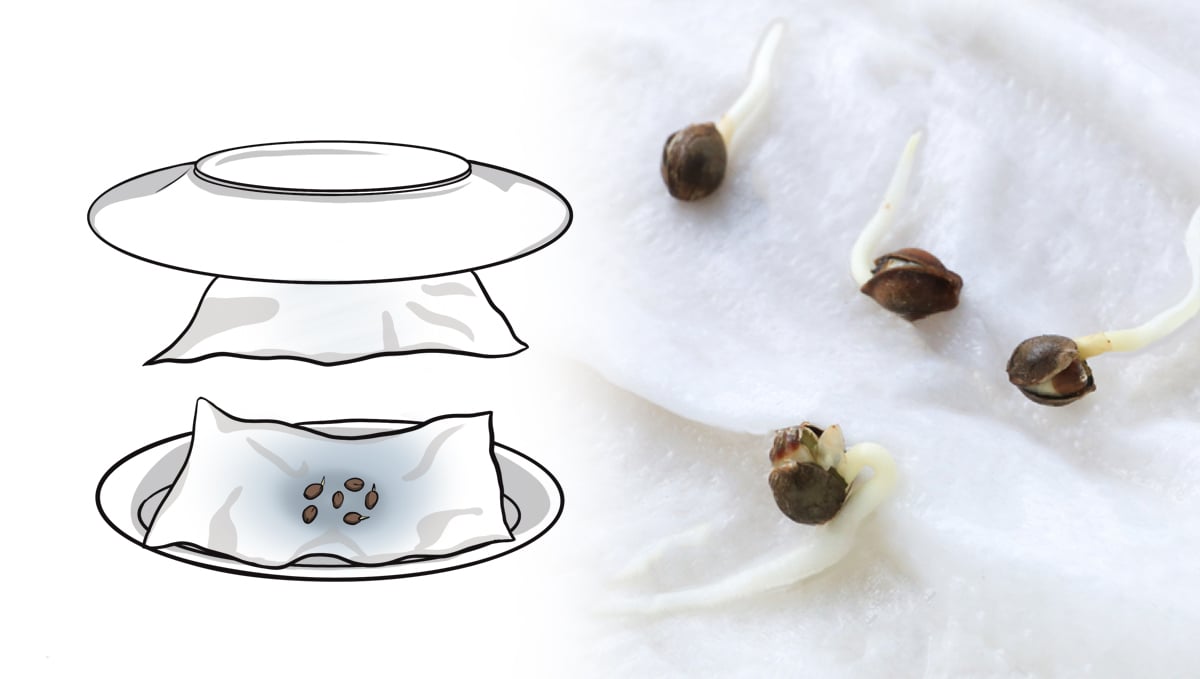
Step 3
Place the container in a slightly warm and dark place. Remember to check on it daily, we must ensure the paper towels never dry out, the seeds need to keep absorbing moisture, it's likely that the seeds will never germinate if they don't. Sprinkle a little bit of water if needed, you'll know they're ready to be transplanted when the radicle is around 1-3cm long.
Tip:
If the paper towel starts having a bad smell, it's a sign of too much water, let it dry for a couple of days, and if the papers continue smelling bad, change the paper towels.
6. Soaking Overnight In A Glass Of Water
After many years of experimenting and looking for the best way to germinate our Fast Buds seeds, we must say that this is definitely one of the most effective ways.
This method is especially effective for seeds with a harder shell or older seeds. You'll need:
- Glass cup
- Water
Step 1
As the title says, grab a glass cup and fill it half with water.
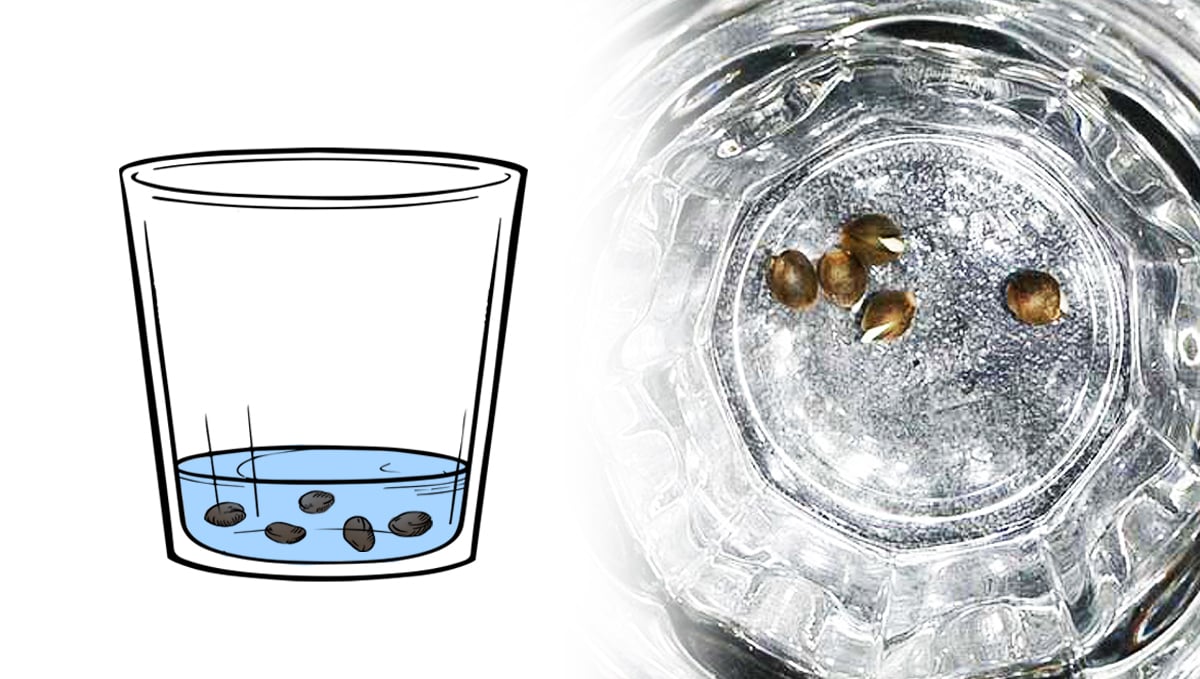
Step 2
Place the seeds in the glass and leave it in a dark place, let the seeds soak for up to 32 hours.
Step 3
Most viable seeds will sink after a couple of hours and you should see the radicle after a couple of days. Remember that some seeds may need longer until you see the radicle coming out. If they haven't sprouted after 72 hours, add a few drops of hydrogen peroxide to kill accumulated bacteria in the water and return to the darkness for 2 more days.
7. Using A Germination Chamber
When you get a bit more experienced, you'll wanna look for more professional tools and the germination chamber is one of them. It consists of a plastic base with small square cells (can come with up to 256 cells, each cell supports 1 seed), on top of a heat mat, also comes with a humidity dome, basically looks like a small greenhouse. They're very cheap and you can make one at home.
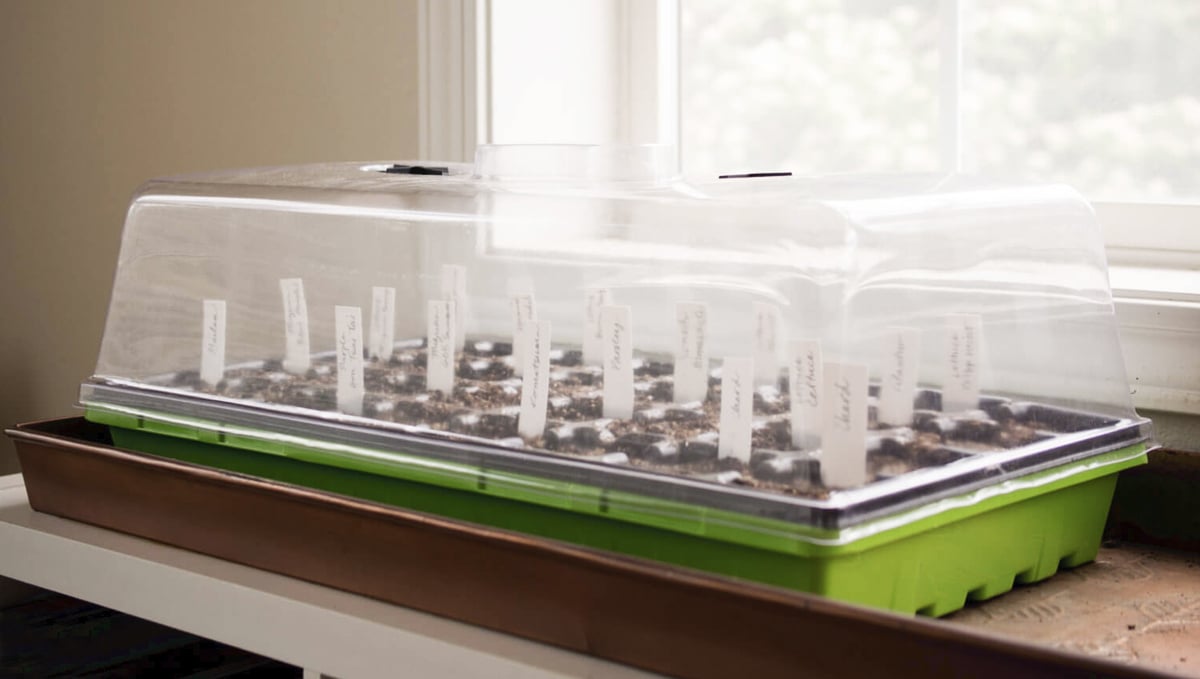
The chamber can be used with any type of medium, Rockwool cubes, peat pellets, coco fiber, perlite, or even soil and they keep the best environment for sprouting seeds and the first days of the seedling.So how to germinate a marijuana seed in a germination chamber? To start germinating, make a small hole (1-2 cm) in moisten medium, cover without applying pressure, turn on the heat mat and spray the humidity dome, it should take a couple of days to see the seedling coming out.
8. Rockwool Cubes And Peat Pellets
Rockwool cubes are small cubes made of rock and sand fibers, with the consistency of cotton candy almost, they absorb a lot of water and usually are used for germinating seeds and clones. Using them along with the germinating chamber has an advantage, being easy to transplant to the next medium or container.
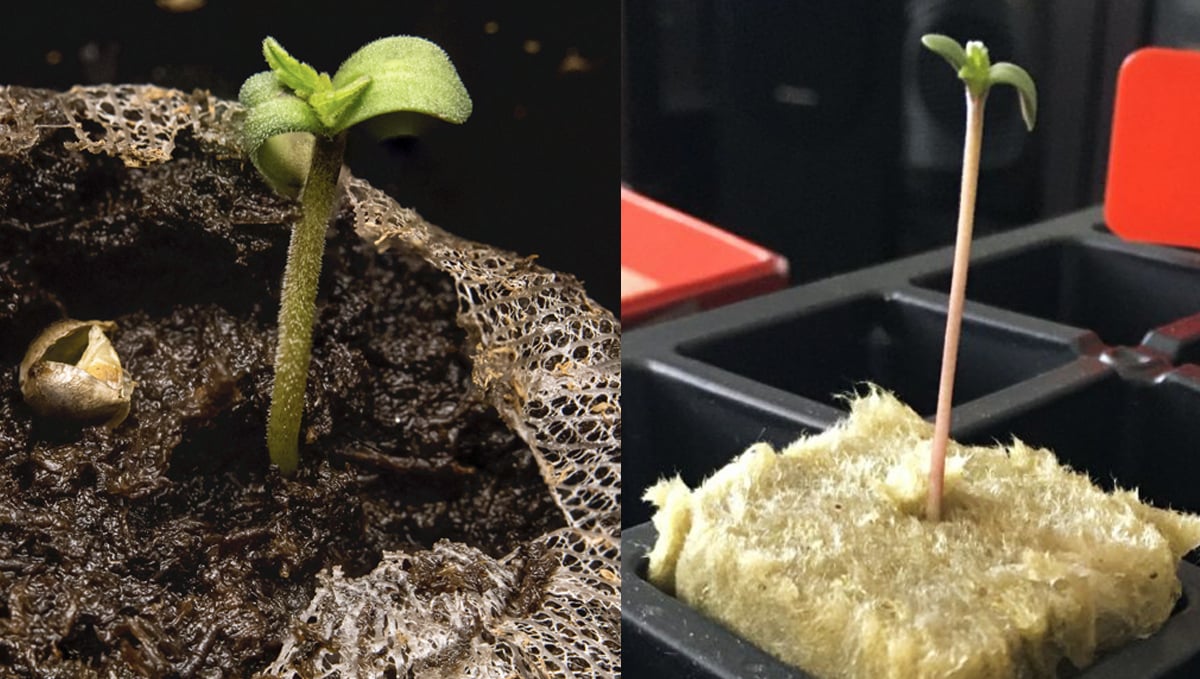
They also can be used along with clay pellets in hydroponics. One of the bad aspects of Rockwool cubes is you can easily overwater and get root rot. Peat pellets are similar to the Rockwool cubes but are made of compressed peat moss and come in a small disc shape. To germinate in either one of them, we will use the same technique explained before, moisten the Rockwool or peat pellet, make a little hole (1-2cm) and place the seed inside, cover it gently without applying pressure and you're all done. You can place the pellet or cube directly in any type of medium or hydroponics chamber, after sprouting, the roots will continue to grow down, even if they reach the end of the Rockwool or peat pellet.
9. Planting Directly In Medium
Sometimes the simplest way is the better way. As it happens in nature, we can also sprout our seeds in our medium of your preference (coco, soil, perlite, etc..) Just grab a pencil, or even with your fingers, make a little hole (1-2cm deep), and place the seed in it, the medium must be moist but not soaking, then cover with soil without applying pressure.
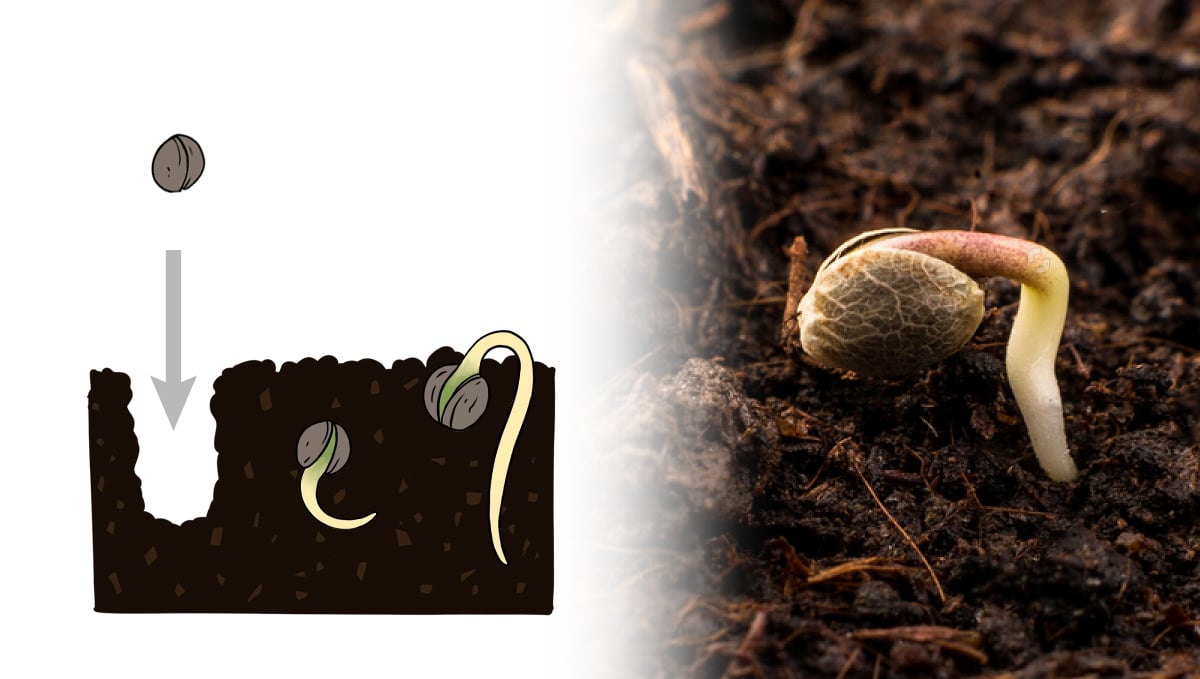
Every time you transplant a seedling, it needs some time to readjust and can cause stress, thus one of the biggest benefits of this method is you don't have to worry about damaging your seedling when transplanting or shocking it because it already is in its final place.
10. Top Tips to Improve Seed Germination
Planting the Seeds Correctly
Cannabis seeds have an oval shape with one of the ends being sharper while the other has an indent known as the crown. When germinating cannabis seeds, it’s recommended to plant the seed with the crown pointing upwards as this is the end where the cotyledons usually come out from.
Don’t Let the Substrate Dry Out
The germination process relies on moisture to activate the biological processes that provide the energy the seedling needs to break through the seed shell and start growing. This means that the more moisture absorbed, the better. Note that the keyword here is moisture, you definitely don’t want to drown your seeds. Anyway, once the seed is in the paper towels and the germination process has begun, make sure to check regularly to ensure it’s still moist, and to help with this, it’s recommended you keep it in a warm damp place.
For better germination rates, you can opt for a heating mat and/or germination chambers, but it really doesn’t matter if you’re germination your seeds in the soil, jiffy’s, Rockwool cubes, paper towels, etc… Make sure to keep the substrate moist and you will have great results.
Planting the Seed at the Right Depth
One of the bigger issues among beginner growers is planting the seed at the right depth. These problems can get worse if you are watering the substrate after the seeds are planted. Remember, burying the seed too deep can cause it to not develop while not burying deep enough can cause the taproot to over-bend and develop a weak stem, and sometimes stunt growth.
This is why we recommend burying the seed at around 2 cm deep. You can do this by using a ruler, marking the 2 cm mark on a straw, or any other utensil that allows you to do this. Then plant your seed and cover it with the substrate without pressing too hard.
Avoid Planting several Seeds in the Same Pot
Sometimes you may not have enough substrate or pots, typically, this is when you would plant multiple seeds in the same container but they usually do not develop correctly due to several reasons. Now yes, you’re saving space and substrate but you’re definitely not helping your plants thrive as first of all, the roots need enough space to grow, and germinating in the same pot can cause the roots to fight for space.
Apart from fighting for space, if all the seedlings make it to the vegetative stage, they will continue competing for light and by doing this, you will not get the most out of each plant. Lack of light can also cause the stem and branches to grow weak which can cause problems during flower so make sure to plant one seed per pot unless you’re growing in 100-200L or bigger raised beds.
11. What to Expect in the First Couple of Days After Planting A Germinated Seed
Ok, you have successfully germinated your seeds, and have planted them 2 cm deep - with each seed in a separate pot. What should you expect next? It can take anywhere from 24 hours to several days for the plant to emerge from the substrate. One of the most common mistakes that beginners make when waiting for their germinated seeds to break through the soil (or whatever medium they are using) is to be impatient. The last thing you should ever do when waiting to see a plant emerge is to go searching.
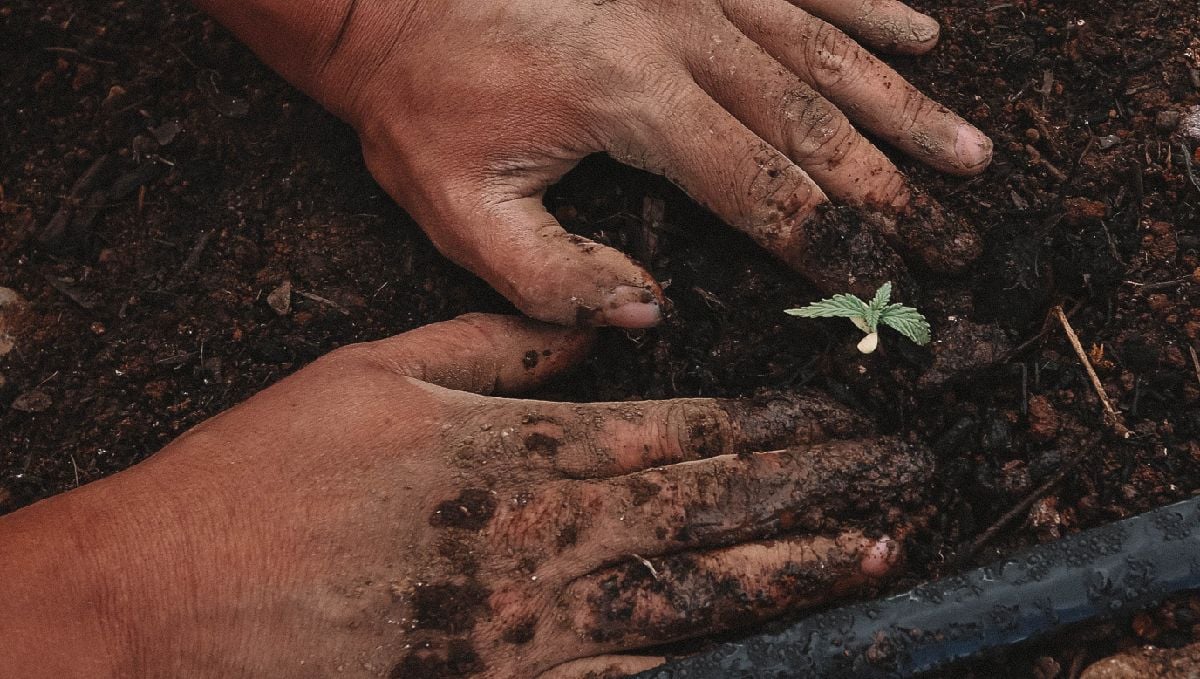
The tap root is extremely fragile and sensitive and can easily be damaged. Resist any temptation to go digging around to see what's going on and trust the process. If you have followed the germination steps laid out above and planted the seed correctly once you have seen the tap root emerge then there is no reason to worry about the plant itself. But, does this process ensure that every seed will successfully germinate and grow into a healthy plant? No, there's no guarantee that every single seed will germinate, or that every germinated seed will turn into a beautiful cannabis plant. But there are a few things you can do to help increase those chances.
- Buy your seeds from a reputable, highly-rated seed bank - There are an almost endless supply of websites and companies that offer seeds these days. But not all seed banks are created (or run) equally. If you want to increase your chances of getting top-class seeds with high germination rates, you should research what other growers are saying about the seeds they have bought. Look for seedbanks that offer a germination guarantee, as this is a great sign that the company is confident that every single seed they send out will have a very high chance of germination.
- Store your seeds correctly - If you are planning on buying a batch of seeds but you are not sure when you will germinate and plant them, it is imperative that you store the seeds correctly. Any fluctuation in temperature or humidity can kill cannabis seeds pretty quickly, and they hate being exposed to direct sunlight. The best way to store ganga seeds is in an airtight container (like a film canister or a tupperware container) in a cool, dark place. We like to also keep them in the back of the fridge or freezer, and if you have a spare packet of silica beads laying about you can add that into the container to help reduce the chance of any moisture issues. Also, don't expect old seeds to germinate. If you have had a packet of seeds sitting in your drawer for months or even years, there is no guarantee that they will still be viable. Cannabis seeds have a pretty good chance of lasting a long time if stored correctly, but even the best-stored seeds have a limited shelf life.
- Make sure the pH levels are correct during the whole process - This is another facet that is often overlooked by beginner growers. Using water at the correct pH level is one of the most important aspects that any and all cultivators should consider, no matter what style of cultivation. For seed germination, it's best to use either reverse osmosis water or distilled water, and for this water to be between 5.8 - 6.2 pH. This range is also perfect for seeds that are then going into a full hydro set-up, or coco-coir. If you are planting your germinated seeds into a soil mix, then it's best to keep the pH range between 6.5 - 7.5. Remember to rinse your soil mix or coco-coir with properly pH'd water before planting and to regularly test the runoff. This helps you get a feel for the pH of the substrate. Always water until you see a decent amount of runoff.
- For outdoor cultivation - Keep your babies out of the rain as much as possible. This could be as simple as planting when you know the rain will not be an issue or moving your plants to cover when you know the rain is coming. You can also build a simple greenhouse setup to offer protection from the elements, but keep in mind that this can increase temps and humidity levels.
Once you have planted your germinated seed, you can expect to see growth appearing in the next 1 to 5 days. If it takes any longer than this, you may have an unviable seed on your hands. If you still see zero growth after a full week or so, you can go ahead and have a careful dig around to see what's happening, but at this point, it's best to expect that the seed is a dud. When the plant emerges from the substrate, it's time to get her under the sun as quickly as possible. Water the crop once a day with water that has the correct pH range, keep an eye out for any early signs of deformation or nutrient issues, and enjoy the process!
If you want to get your hands on some of the best autoflowering genetics available right now, head right here and browse the entire collection. There's a huge range on offer, with a bunch of new strains being released just a few months ago (plus all of the FastBuds classics). Every single seed comes with a 100% germination guarantee, meaning you have absolutely nothing to worry about!
EXPERT OPINION BY JORGE CERVANTES - CO-AUTHOR:
The article provides a thorough and well-researched guide to germinating autoflowering cannabis seeds. Understanding the scientific principles and fundamentals of cannabis seed germination is paramount to avoiding problems and achieving a successful harvest. The guide covers essential topics such as the anatomy of a cannabis seed, the importance of maintaining proper temperature and humidity levels, and different germination methods. It also provides valuable tips for overcoming common challenges, such as germinating old seeds or planting seeds at the correct depth.
Promoting organic growing practices, sustainable and responsible cultivation, and sharing knowledge are essential for the long-term success and viability of the cannabis industry.
The article aligns with these principles by providing practical and actionable advice for germinating cannabis seeds successfully. It also emphasizes the importance of starting with good-quality seeds from reputable vendors. It provides a germination warranty from Fast Buds, which is a testament to the company's confidence in the quality of its seeds.
12. In Conclusion
There's no such thing as the best way to germinate marijuana seeds, a successful germination is considered when you see the first leaves, known as Cotyledons, cannabis seeds germinate correctly with relatively high temperatures and humidity. To successfully reach the flowering stage you'll have to use different techniques, not only for sprouting but to keep the plant happy and healthy until harvest.
Whether deciding which germination method to choose or getting ready for your first successful grow setup, our advice for beginner growers will be to start with autoflowering strains. If you look for something easy, quick, and easy to maintain, like Lemon Cherry Cookies Auto and Gorilla Cookies Auto, there’s nothing better than choosing to grow autoflowers.
Remember that the best way to germinate marijuana seeds is to keep your germinating seeds at 26 - 28C (78.8 - 82.4F) and 70% relative humidity. Lower values will result in a slower, less successful, or not successful germination at all.
Just have in mind that the most important thing is to have good quality seeds because even if you have proper conditions, a bad seed is still a bad seed, so we recommend you buy your seeds from reputable vendors. At Fast Buds we offer a germination warranty - if your seeds fail to germinate we will replace them for free!
Good luck with your babies!
External references
- Temperature requirements for guayule seed germination. - Wang, Guangyao & Lynch, Amber & Cruz, Von & Heinitz, Claire & Dierig, David. (2020).
- Seed germination. - Mishra, Shwetakshi. (2020).








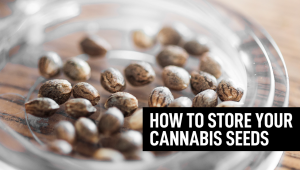



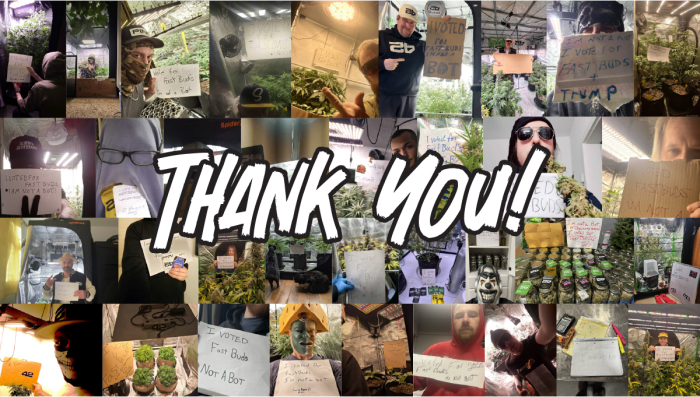
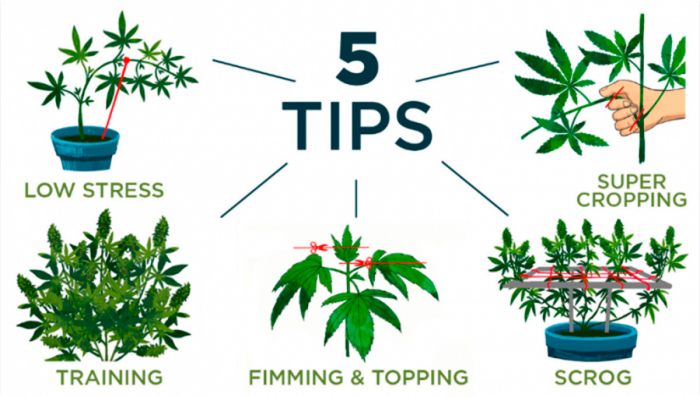
Comments